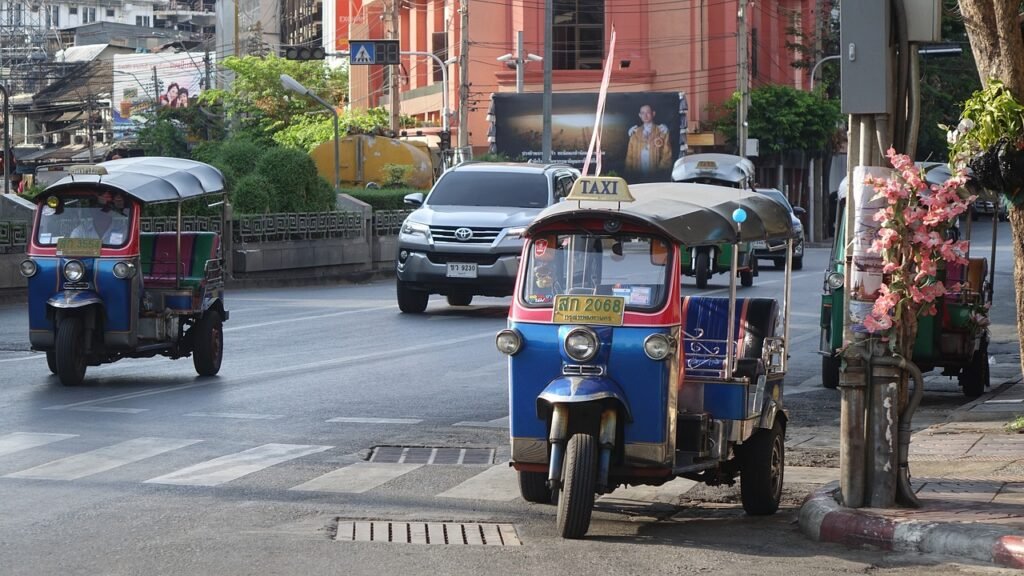Thailand, known as the “Land of Smiles,” is a prime destination attracting millions with its rich culture, vibrant cities, and stunning natural landscapes. However, the popularity of tourist spots like Bangkok, Phuket, and Chiang Mai also brings the risk of scams targeting visitors. In this article we cover the common tourist scams in Thailand. These scams, ranging from overpriced tuk-tuk rides to sophisticated shopping frauds, can compromise both the safety and enjoyment of travellers. Recognizing and understanding these scams is crucial for anyone visiting Thailand. Being informed not only helps avoid these pitfalls but also ensures a more enjoyable and secure travel experience, allowing visitors to fully embrace the beauty and hospitality of Thailand.
This post may contain affiliate links to things like hotels, tours or products. These help us earn a small commission at no additional charge to you and help keep the lights on at Destination Someplace.
Understanding Tourist Scams in Thailand
A tourist scam involves deceptive practices specifically aimed at exploiting travellers. These scams often capitalize on a tourist’s lack of local knowledge, language barriers, and the novelty of the travel experience. The main goal is to trick visitors into paying for non-existent services, overpriced goods, or misleading information, leading to financial losses.
General Motives Behind These Scams
The primary motive behind tourist scams is financial gain. Scammers target tourists because they often carry more cash, are typically willing to spend on experiences and souvenirs, and are perceived as wealthy by local standards. Additionally, tourists are less likely to be familiar with local pricing, legal systems, or scam tactics, making them easier targets.

Why Tourist Scams Are Prevalent in Tourist-Heavy Areas
High Turnover of Targets: Tourist-heavy areas continually provide a fresh stream of new visitors who may be unaware of common scams. This high turnover allows scammers to repeat the same scams without the risk of quickly being caught or identified.
Economic Dependence on Tourism: In regions heavily reliant on tourism, there is both greater temptation and more rationalization for scamming as a way to supplement income, especially during off-peak seasons.
Anonymity in Crowds: Busy tourist spots provide anonymity for scammers, making it easier for them to operate without being noticed or caught by local law enforcement.
Limited Consequences: Tourists are usually in a country for a short time and may not pursue legal recourse for small to moderate losses, making scams relatively low-risk for perpetrators.
Understanding these motives and the mechanics of tourist scams can help travellers remain vigilant and better prepared to protect themselves while enjoying their journeys in tourist-dense locales like Thailand.
Common Types of Tourist Scams in Thailand
Transportation Scams
Tuk-tuk scams: Tuk-tuks, the iconic three-wheeled vehicles popular in Thailand, are often involved in scams targeting tourists. Drivers may offer seemingly cheap rides, only to take passengers on longer routes or to specific shops where they receive commissions for any purchases made by tourists. These commission-based stops can include gem shops, tailors, or souvenir stores, where tourists are pressured into buying overpriced items. This is one of the most common tourist scams in Thailand.
Taxi scams: Taxi drivers in tourist areas sometimes refuse to use meters and instead negotiate flat rates that are significantly higher than the actual fare. In some cases, drivers may take longer routes to increase the fare, exploiting tourists’ lack of familiarity with local geography. Additionally, there have been reports of taxi drivers falsely claiming that a hotel or attraction is closed, then offering to take tourists to alternative, often more expensive destinations where they receive kickbacks.
Scooter rental scams: Renting scooters is a popular mode of transportation for tourists in Thailand, especially in beach towns and islands. However, some rental agencies engage in scams by accusing renters of causing pre-existing damage to scooters upon return. Tourists are then pressured into paying exorbitant fees for repairs or damages that they did not cause. It’s crucial for tourists to thoroughly inspect rental vehicles before use and document any pre-existing damage to avoid being scammed.

Accommodation Scams
Fake hotel bookings: With the rise of online booking platforms, scammers have created fake websites that mimic legitimate booking sites. Tourists may unknowingly make reservations and payments for hotels that either do not exist or are vastly different from what was advertised. Upon arrival, they find themselves stranded without accommodation or forced to accept subpar alternatives at higher costs.
Pressure to change accommodations: In some cases, tourists are misled by drivers or guides who claim that their booked hotel is closed, overbooked, or in an unsafe area. These individuals then pressure tourists to change their accommodations to a different hotel where they receive commissions or kickbacks. Tourists may end up paying more for inferior accommodations due to these deceptive practices.
Tour Scams
Fake entry fees: Scammers target popular tourist attractions by charging unsuspecting tourists entry fees, even though the sites are actually free to enter. This scam relies on tourists’ lack of knowledge about local pricing and can result in unnecessary expenses and frustration.
Closed attraction scam: In this scam, tourists are informed by touts or guides that a popular attraction is closed for various reasons, such as renovation or a public holiday. The scammer then offers to take tourists to alternative sites or activities, often less worthwhile and more expensive. This tactic is used to redirect tourists to locations where the scammer has partnerships or stands to profit.

Shopping Scams
Gem scams: Thailand is known for its gemstone industry, but tourists should be wary of scams involving fake or overpriced gems. Scammers may pose as gem traders offering valuable gems at bargain prices, only for tourists to later discover that the stones are low-quality or completely worthless.
Counterfeit products: Markets and street vendors in tourist areas often sell counterfeit goods, including fake designer clothing, accessories, electronics, and DVDs, presented as genuine branded items. Tourists who purchase these counterfeit products often pay inflated prices for inferior quality goods.
Entertainment Scams
Bar and club scams: Tourists visiting bars and clubs in tourist areas may encounter scams involving exorbitant prices for drinks or special performances. In some cases, tourists are lured in with promises of cheap or free entry, only to face hidden charges or inflated prices once inside. Scammers may use intimidation tactics to coerce tourists into paying the inflated bills.
Pickpocketing and theft: Crowded entertainment venues, such as night markets, festivals, or street performances, are prime targets for pickpockets and thieves. Tourists, distracted by the sights and sounds, may become easy targets for thieves looking to steal wallets, phones, or other valuables. Pickpocketing is especially prevalent in crowded areas or during events where tourists are preoccupied with entertainment.

Food and Beverage Scams
Spiked food and drinks: Unscrupulous individuals may drug tourists’ food or drinks with substances like knockout drops or date-rape drugs, leading to theft or extortion. Tourists who consume spiked food or drinks may become disoriented or incapacitated, making them easy targets for theft.
Dual pricing: Some establishments, particularly in tourist-heavy areas, practice dual pricing, where tourists are charged significantly higher prices than locals for the same goods or services. This practice is often justified by claiming that tourists can afford to pay more or that the higher prices include additional services or amenities not offered to locals.
Currency and Credit Card Scams
Credit card skimming and cloning: Tourists using credit cards are vulnerable to skimming devices installed on ATMs or card readers by criminals. These devices capture the card information, which can then be used to make fraudulent purchases or withdrawals.
Overcharging or incorrect change: Tourists may be overcharged or given incorrect change by vendors, particularly in busy areas where transactions are conducted quickly. Some vendors may intentionally give incorrect change or overcharge tourists, banking on their lack of familiarity with local currency or the exchange rate. Tourists should always double-check their change and be wary of vendors who rush or refuse to provide receipts.

How to Recognize and Avoid Scams
Signs of a Scam
Recognizing the signs of a scam is crucial to avoiding them. Here are some common indicators that should raise red flags for any tourist:
Unusual Urgency or Pressure: Scammers often create a sense of urgency to push their targets into making hasty decisions. This may be expressed as a limited-time offer, a claim that spaces are running out, or that immediate action is required.
Prices Significantly Lower or Higher Than Expected: If a deal seems too good to be true, it probably is. Similarly, exorbitant prices for simple services (like a short taxi ride) can also be a sign of a scam. Tourists should be wary of both extremes.
Lack of Proper Credentials or Identification from Service Providers: Reputable service providers will have the appropriate credentials and are usually willing to display them. Scammers often lack such documentation or may offer fake or dubious credentials.

Preventative Measures
Taking proactive steps can significantly reduce the risk of falling victim to scams. Here are some preventative measures tourists can employ:
Using Reputable Service Providers: Stick to service providers who have good reviews and are recommended by reliable sources, such as official tourism websites, well-known travel guides, or established travel platforms. Booking transportation and tours through your hotel can also be safer.
Verifying Prices and Services in Advance: Before committing to any service, check the going rates and terms. This can be done by consulting with your hotel staff, looking up information online, or asking locals for typical prices. Always agree on prices before accepting services, especially for transportation and tours.
Keeping Valuables Secure and Using Safety Equipment Provided: Tourists should use safety equipment provided, like locks for scooters or safes in hotel rooms, and maintain vigilance over their personal belongings. Avoid displaying expensive jewelry, gadgets, or large amounts of cash in public. Utilizing money belts or anti-theft bags can also help protect valuables.
By recognizing the common signs of scams and adopting these preventative measures, tourists can safeguard themselves and ensure a more enjoyable and secure experience while traveling.
Strategies for Dealing with Scams
Steps to Take When You Realize You’re Being Scammed
Confront Calmly: If you suspect a scam, address the issue calmly but firmly. State your concerns and indicate that you are aware of the normal procedures or prices.
Disengage: Safely remove yourself from the situation if possible. If you are in a vehicle or an isolated location, ask to be taken to a busy public area or directly to a police station.
Gather Evidence: If it’s safe to do so, collect evidence such as receipts, brochures, or photos of the scammer and the surroundings. Note down vehicle registration numbers or any identifying details.
Legal Resources and Local Authorities to Contact
Tourist Police: Thailand has a dedicated tourist police force, equipped to deal with issues affecting tourists, including scams. They can be contacted via phone (1155) or in person at popular tourist locations.
Embassy or Consulate: Contact your embassy or consulate if the scam involves a significant amount of money or if you feel your safety is threatened.

Importance of Staying Calm and Collected
Maintaining composure is crucial. Reacting emotionally or aggressively can escalate the situation and compromise your safety. Staying calm helps you think clearly and make rational decisions about how to proceed safely. It also aids in communicating effectively with authorities or bystanders who might assist you.
By understanding these strategies, tourists can better manage difficult situations and mitigate the effects of scams during their travels.
Resources for Tourists
Trustworthy Local Contacts
Tourist Police: Available specifically to assist tourists, they can be contacted at the hotline number 1155 for any emergencies or issues related to scams.
Embassies and Consulates: Always have the contact information of your country’s embassy or consulate handy. They provide crucial support in cases of serious legal troubles or emergencies.
Local Authorities: Local police stations are also an important contact, although for immediate tourist-related issues, the Tourist Police are often more equipped to assist in multiple languages.
Websites and Apps for Real-time Information and Assistance
Thailand Tourism Authority Website: Offers updated travel advisories, tips on avoiding common tourist traps, and essential contacts.
Safety Apps: Apps like ‘Tourist Buddy‘ and the ‘Tripit: Travel Planner‘ app with its neighbourhood safety scores feature are designed to provide tourists with instant access to safety tips and location-based services.
Travel Forums and Review Sites: Platforms like TripAdvisor and the Lonely Planet Facebook Group allow travellers to share recent experiences and advice, including alerts on new scams.
Having access to these resources can significantly enhance a tourist’s ability to navigate unfamiliar environments safely and enjoy a more secure travel experience in Thailand.

Travelling to Thailand offers an unforgettable experience, filled with rich culture, stunning landscapes, and vibrant markets. However, maintaining awareness and exercising caution are crucial to avoiding the pitfalls of tourist scams. By staying informed and prepared, visitors can safeguard themselves against common scams and fully embrace the beauty and hospitality of Thailand. Enjoy your travels by making use of the valuable resources and tips provided, ensuring a safe and memorable journey through the Land of Smiles.
Top Tips – Thailand
For travel insurance, we use and recommend using Staysure – specialists in over 50’s travel insurance, as we have always found them fair and easy to deal with.
Check our resources page for more budget tips and discounts from our days in transit!
Other Posts That May Be of Interest

Steve and Mrs A
On this website, we detail some of our experiences and have put together some tips to help independent travellers who are still young in spirit.

